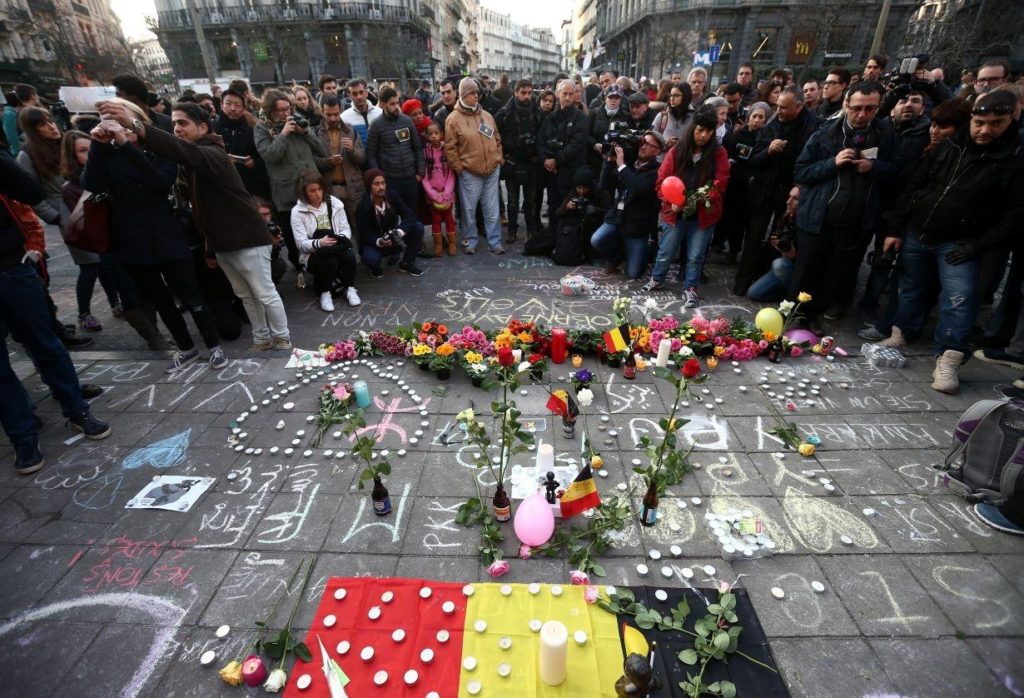The blank screen in front of me begs me to come up with words I cannot think of. Words are often inadequate to describe reality, let alone to understand it. Four days ago more than thirty people lost their lives in the Brussels bombings. How should we respond to such evil? How can we make sense of what has happened? How can we prevent such tragedies from happening again? These and numerous other questions haunt us like ghosts that cannot be expelled, not even by a plethora of opinions and analyses.
A toxic cocktail
In the immediate aftermath of the attacks all sorts of conflicting theories have been enunciated to explain what had happened and why certain individuals become suicide bombers. It requires expertise in psychology, sociology, political science, criminology and religious studies to be able to analyse radicalisation and terrorism, and even then it is difficult to determine what constitutes a terrorist mindset. The terrorist mindset is a toxic cocktail of ideas, fantasies, frustrations and feelings. Some ingredients are more important than others, but there is not a single recipe for such a cocktail. The fact that our explanations are so conflicting illustrates our inability to even agree on a list of ingredients.
Conflicting explanations
According to some, we have been too kind and generous to Muslims, even turning a blind eye to a radicalizing minority and that explains why terrorists become terrorists. Others hold the opposite is true: radicalisation results from the fact that we have been too harsh on Muslims; daily racism and hatred have pushed these individuals towards fundamentalism.
Equally deep seems the abyss between those who claim that terrorism has its direct roots in Islamic faith, and those who don’t believe there is anything in Islam that justifies terrorism: not religion, but socio-economic deprivation and frustrations are the main ingredients of the terrorist mindset.
Another paradigm of opposing explanations concerns international politics. Some argue that the attacks in Europe are a reaction to the fact that European countries have been bombing IS targets for several years now, whereas others argue that it is precisely the West’s lack of involvement in the fight against terror, and its unwillingness to eradicate IS when it was still fairly small that got us where we are today.
According to some the current Belgian government is to blame, according to others the socialists, and in particular Philippe Moureaux, the socialist mayor of Molenbeek from 1993-2012. They are said to have created a climate in which vipers of fundamentalism were nourished in the heart of Brussels.
A comprehensive theory
However diverse these explanations may seem, they are not entirely irreconcilable, as there might be some truth in each of these different positions. In order to understand the terrorist mindset we need a comprehensive theory that incorporates the elements of truth contained in these different perspectives, while filtering all the nonsensicalities that often accompany them. Such a theory would not seek to pinpoint a single cause for an incredibly complex phenomenon, would not criminalize an entire religion–or religion itself–and would not hold an entire demographic group accountable for the acts of certain individuals. And most importantly, it should be a theory that does not entail a moral inversion.
When good becomes bad
The term ‘moral inversion’ was coined by the Hungarian-British polymath Michael Polanyi in a rather complex theory about higher and lower levels of reality, knowledge and moral passions. According to Polanyi a moral inversion manifested itself in Marxism and nihilism: what used to be a high value and a moral good is degraded and presented as low and bad by the new ideologies. It is reminiscent of German philosopher Max Scheler’s concept of value distortion. According to Scheler, resentment fuels a distortion of values. What is good and valuable is always difficult to realize and cannot be achieved easily or by everyone. That is why the pursuit of a better life, and indeed life itself, can become a source of frustration and synonymous with failure. Frustrations and failure make life unpleasant, even to such an extent that the temptation arises to turn the moral order upside down: good becomes bad, failure stops being a failure, heroes become villains, perpetrators become victims, victims are blamed for the harm that is inflicted upon them.
Victimizing perpetrators
I cannot help but think of that when I read certain analyses of radicalization. A case in point is Arun Kundnani’s claim that the West is responsible for being the target of terrorists. Kundnani is a British-American professor and author of several books on extremism, Islamophobia and terrorism. In an op-ed, published by the Washington Post a day after the Brussels bombings, he suggests that there are at least three ways in which the West is responsible for having created its own terrorists. The purpose of the argumentation is clear: convincing us that we only have ourselves to blame. We–the West–are the bad guys. They–the terrorists–are the victims.
Bombs and patriotism
The first method, in which the West creates its own terrorists, is by dropping bombs on other countries. One would think the process of radicalization is a complex phenomenon, but according to Kundnani, “it can be easily understood”. You only need to imagine how you would respond if a foreign nation dropped bombs on your country. Many would feel a surge of patriotism and would want to volunteer in the combat against the bomb-dropping perpetrator. This does not in any way help explain why people–Western people–join IS. What is missing in this picture is that a young man of Algerian or Moroccan descent, who has spent his entire life in Brussels or Paris, does not have any national or patriotic ties to Syria, Iraq, or any other country where the West drops bombs in the fight against IS. So it is must be something else and not patriotism or national loyalty that drives these men towards IS. Moreover, if being the victim of an external aggressor who kills many civilians were to inspire a desire to join the fight against the aggressor, IS would never have gotten far in the first place. And of course Kundnani’s reasoning does not in any way explain why IS kills more civilians in non-Western countries than in the West.
Islamophobia
Islamophobia is a second reason why the West is responsible for creating its own terrorists. The West’s Islamophobic attitude is allegedly expressed in the belief that religious extremism is the underlying cause of terrorism. However, Kundnani maintains, there is no empirical evidence to demonstrate a correlation between extremist religious ideas and involvement in terrorism. To underpin this challenging claim, Kundnani argues that many terrorists don’t have a profound knowledge of theology, or do things that their religion would actually condemn, like smoking cannabis. Kundnani confuses religious extremism with theological knowledge, but those are two entirely different things. When we say a person is a religious extremist or a fundamentalist, we make a judgment not necessarily of the things that person believes in, but the way that person expresses his belief in these things. Understood thusly, there is an abundance of evidence that some forms of terrorism are directly linked to religious extremism.
The end of ideology
Last but not least, Kundani refers to the West’s lack of different ideologies. The West is an ideological vacuum and what corrupts and radicalizes young people is not fundamentalist ideology, but the end of ideology: the fact that “they have grown up in an era with no alternatives to capitalist globalization”. What is troubling here is first, the end of ideology is more myth than reality. Secondly, it is a profound expression of a moral inversion: we are to be blamed, liberal democracy and capitalism–that is what “corrupts” these young men who decide to join IS and who take the lives of innocent people in concert halls, on subways and at airports.
Introspection
When faced with setbacks and tragedy introspection is important. It is good to stand in front of the mirror to see where you can improve. It is undeniable that there is much room for improvement; that we can do better in many ways. But if you blindly focus on your own reflection, introspection stops being a good thing. To think that your reflection in the mirror embraces the entire universe and that your own shortcomings are the reason of the shortcoming of others and that you will be able to explain all the wrongs in the world by merely looking at the wrongs you see in yourself, that is a peculiar combination of self-centeredness and self-hate.
Individual responsibility
Though Kundnani’s explanatory model might seem unconvincing to many, we all risk putting too much blame and responsibility for the wrongdoing of others on ourselves. We have been pointing the finger at each other a bit too eagerly. As such we have been neglecting the truth that there is a thing we used to call individual responsibility. A factor that once convinced the Polish philosopher Leszek Kolakowski that no person can hide behind socio-economic conditions, historic circumstances or the modes and mores of the times he lives in, was when he had to account for his own acts. External conditions can influence the extent of our individual responsibility, but they cannot eliminate it. Recognizing this element of individual responsibility allows us to say that terrorists are responsible for their acts of terror, and that blame must not be put on the people and places that are hurt and destroyed by those acts. Claiming the opposite is true implies a moral inversion and is disrespectful to the many who have lost their lives, their limbs, and their loved ones due to the atrocious acts of some.
By Alicja Gescinska


